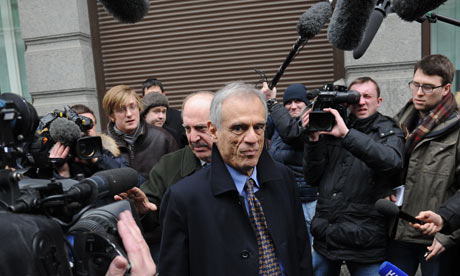Charlie Charalambous guardian.co.uk, Wednesday 20 March 2013 17.40 GMT
Europe has stabbed Cyprus in the back. All us Cypriots can do is grit our teeth, and hope Russia offers a way out
Cypriot finance minister Michael Sarris is pictured in Moscow after talks with Russian officials. Photograph: Sharifulin Valery/ Sharifulin Valery/ITAR-TASS Photo/Corbis
Cyprus has blinked at passing an extraordinary tax on depositors, even if the consequences could mean it exiting the euro and financial chaos. At a vote on Tuesday, the Cypriot parliament threw out the controversial plan to skim €5.8bn (£5bn) from savers' bank accounts, leading to more euro instability.
Cypriots who have scrimped and saved for a rainy day faced the nightmare prospect of international bankers and European technocrats "stealing" their life's savings. Cyprus is a family-orientated country, and many parents have put money away for their children's education – the country has one of the highest proportion per capita of overseas university graduates. They now face an uncertain and turbulent future as banks have remained closed since Saturday, and any meaningful economic trade was placed on standby. The country is now running out of time to find a plan B to its crisis.
England was once described by Napoleon as a nation of shopkeepers; well, Cyprus is a country of small deposit holders. The local economy is built on family businesses and a large international financial sector – both have been crippled by the bailout scenario. There is no planning for the future, just gritting one's teeth for the financial firestorm that awaits. Following the Euro group's combined bail-in-bailout decision, the tax levy was already "locked" on accounts – at 6.75% on deposits up to €100,000 and at 9.9% for amounts above €100,000. People couldn't access their accounts as banks had discounted deposits before customers could withdraw their money, but as of today this is no longer the case after the tax was ditched. Over €30bn of the banking sector's €68bn in deposits are accounts of under €100,000.
Economists now argue that Cyprus is in a lose-lose situation: it is caught between a discredited bank system and foreign investors eager to get their cash out of Dodge. There were pictures in Tuesday's local papers of private jets parked at Larnaca airport after Russian millionaires flew into the island to take their money somewhere else. The feeling among the government and the political parties is that Cyprus has been "stabbed in the back" by Europe while being treated as the euro zone's guinea pig by Germany because it is small and defenceless. The president, Nicos Anastasiades, has made it abundantly clear that Cyprus was backed into a corner and had a gun pointed to its head – it was either the tax or your economy, take it or leave it.
The sense of anger and betrayal is everywhere, permeating every conversation from coffee shops to office buildings. Cypriots believe they are being picked on because of a perception that the island is awash with the ill-gotten gains of the Russian mafia – which is why international creditors were quite happy to tax deposits above €100,000. But Cyprus argued that if it focused solely on wealthy foreign investors, mostly Russians, its reputation as a financial hub was doomed. There is unease that close ally and friend Russia is also made a scapegoat in the island's bailout debacle; Russian deposits in Cyprus are estimated at up to €20bn – larger than the island's economy. "Burdening large deposits with a higher tax would have destroyed our ability to attract foreign investment," finance ministry official Andreas Charalambous told reporters on Tuesday. "Sizeable Russian deposits should not be seen as a problem – there are Russian entrepreneurs everywhere, not only Cyprus."
President Anastasiades was elected last month as the man who could do business with Europe and negotiate a better bailout than his communist predecessor. He also made an election pledge that he would accept a haircut on deposits. His friends in Europe gave him short shrift when he baulked at their bank tax demand, which he said was tantamount to "blackmail". Anastasiades should have walked from the Euro group when given the "suicidal" ultimatum on the bank tax – he did not have a mandate to agree such a move. As a result, his reputation as someone who can influence the Europeans in Cyprus's favour has been badly damaged, but he has accepted the people's voice and is looking for a third way out of the crisis.
At the 11th hour finance minister Michael Sarris is now in Moscow. Cyprus is once again looking to the east for much-needed financial help after its friends in the west gave it an offer it had to refuse.
![The [Greek] European Tragedy](https://blogger.googleusercontent.com/img/b/R29vZ2xl/AVvXsEiWKI5s90SFm1wWTk6bs4p7CgslaC2SnYPsrZhb-B-smOufNNCSxCvpBLI9hOB-LsXZjir_PNmEiMk2-E62F3xkg96IoC6QFAaZAnPRTVH340IN9WBRmWJqPkjWlgyRj3zpALp7h6hvA58/s920/GkBack_new.jpg)
